






Funded by Student Sustainability Fees
Presented by:

The Atlanta Herpetology Club was founded in October 2006 and is dedicated to education and conservation efforts around reptiles and amphibians. Throughout the semester, the club hosted guest speakers, meetings and workshops, field expeditions, on-site surveys, and tours of the Amphibian Foundation and Zoo Atlanta’s Reptile House.
The club used its grants funds to fund their survey camping trip, guest speakers, tours, and miscellaneous materials and supplies.
Group membership of the Atlanta Herpetology Club at Georgia State University has increased by 200%, with over 100 active members; social media engagement has also increased.
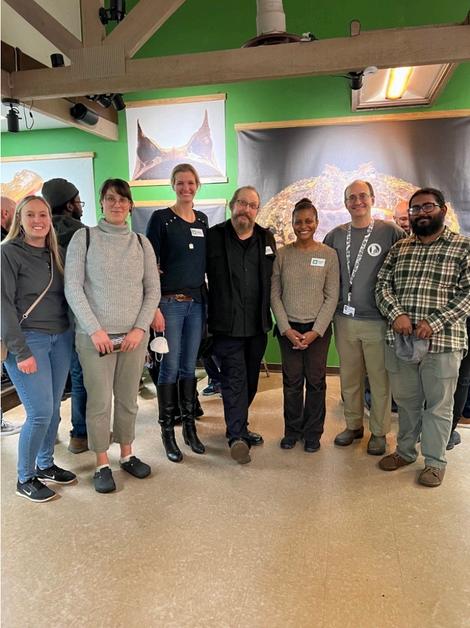

Land Sinks: The Atlanta Herpetology Club engages in the conservation of native herpetological species and their habitats, which contributes to enhancing land sinks. By preserving and restoring ecosystems, species thrive, and biodiverse environments can naturally take carbon and store it in soil, reducing carbon dioxide emissions.
Through collaborations with the Orianna Foundation, the Amphibian Foundation, and the Georgia Reptile Society, students gain knowledge and can actively engage in herpetological research.
Jose Arellano Amount awarded: $11,229.73
Sustainability Initiatives implemented Centralized Waste Stations to replace single-stream recycling bins. Multi-stream recycling helps GSU increase the amount of recycling collected, reduce contamination from single-stream recycling, and reduce custodial and labor costs.
Centralized Waste Stations consist of color-coded and labeled bins designed to help separate recyclable materials. The materials collected at centralized waste stations include plastic bottles, cans, and paper. Some stations also accept plastic bags, cardboard, and foam packaging.
The stations are in faculty and staff breakrooms, copy rooms, and high-traffic student areas. The grant funds were used to order more Slim Jim bins to create the stations.
Thanks to our centralized waste stations, GSU recycled 562.97 tons of materials in 2023—a 42.6% increase from 2021.
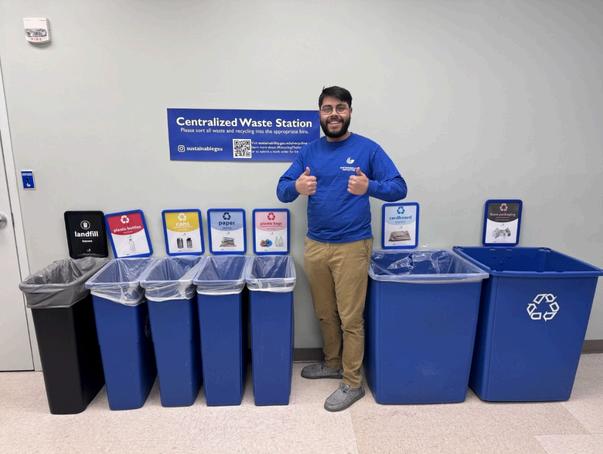
Sustainable Development Goals
SDG 11: Sustainable Cities and Communities
The Centralized Waste Stations are designed to reduce the number of recyclable materials that end up in landfills, reducing environmental impact and promoting a cleaner campus
Research and Innovation
GSU’s Innovative approach to recycling has led to year-over-year increases in material diverted and has been highlighted by College and University Recycling Coalition.
Student Success
By standardizing the recycling practices across campus, recycling is simpler and more accessible for students. Sustainability Initiatives also offers volunteer opportunities where students can build and maintain the Centralized Waste Stations.
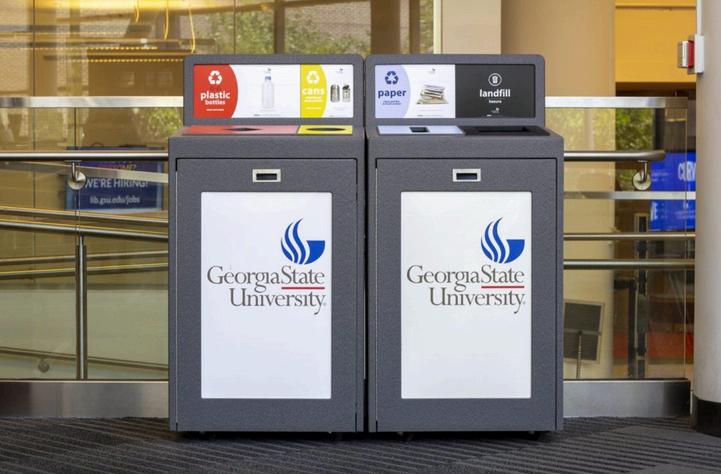
In partnership with Red Wagon, Sustainability Initiatives department hosted Goat Yoga with petting zoo sessions for students to de-stress the week before finals.
This was Sustainability Initiatives’ most successful Sustainable Spring event, with over 400 individuals joining us at Unity Plaza.
Goats are a great way to do eco-friendly landscaping. Goats will eat almost any plant, including invasive species and plant species that are harmful to humans Using goats reduces the use of fuel from equipment and pesticide use.
Sustainable Development Goals
SDG 3: Good Health and Well-being
Interacting with animals has been scientifically proven to improve physical and mental health
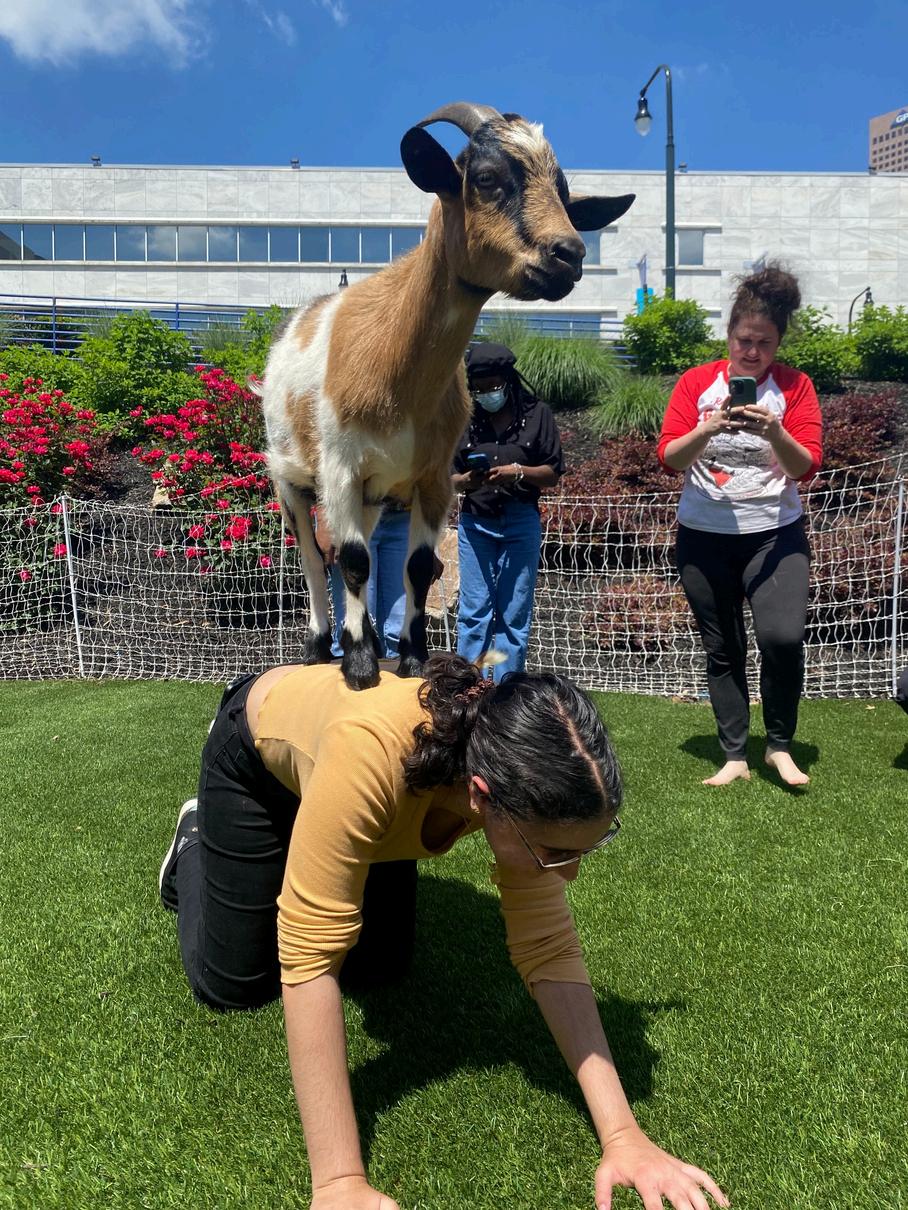
Sustainability Initiatives hosted its first Green Gala to honor the winners of the Campus Sustainability Grant Program. The theme of the Green Gala was Sustainable Spring.
The event kicked off with a mocktail and mingle hour, followed by a guided tour of the rooftop garden at Center Parc Stadium, led by Rachel Calhoun and Elizabeth Plumart from the Student Environmental Team. After the tour, participants attended a presentation by the grant program winners The evening concluded with a musical performance by Sustainability Intern Clinton Brennan II, who showcased his original sustainability rap.
Attendees were also able to get first dibs on the newest re:loom merch!
Sustainability Initiatives hopes to make this a yearly tradition for future grant winners.
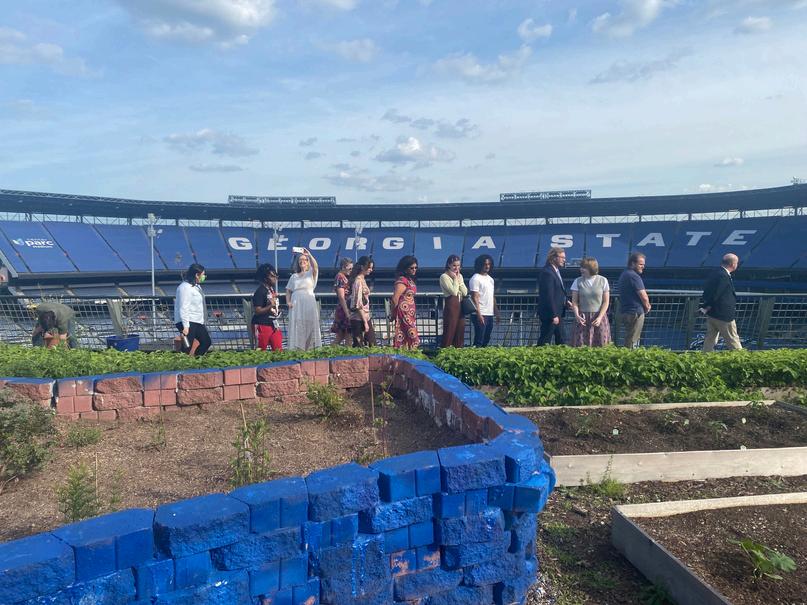
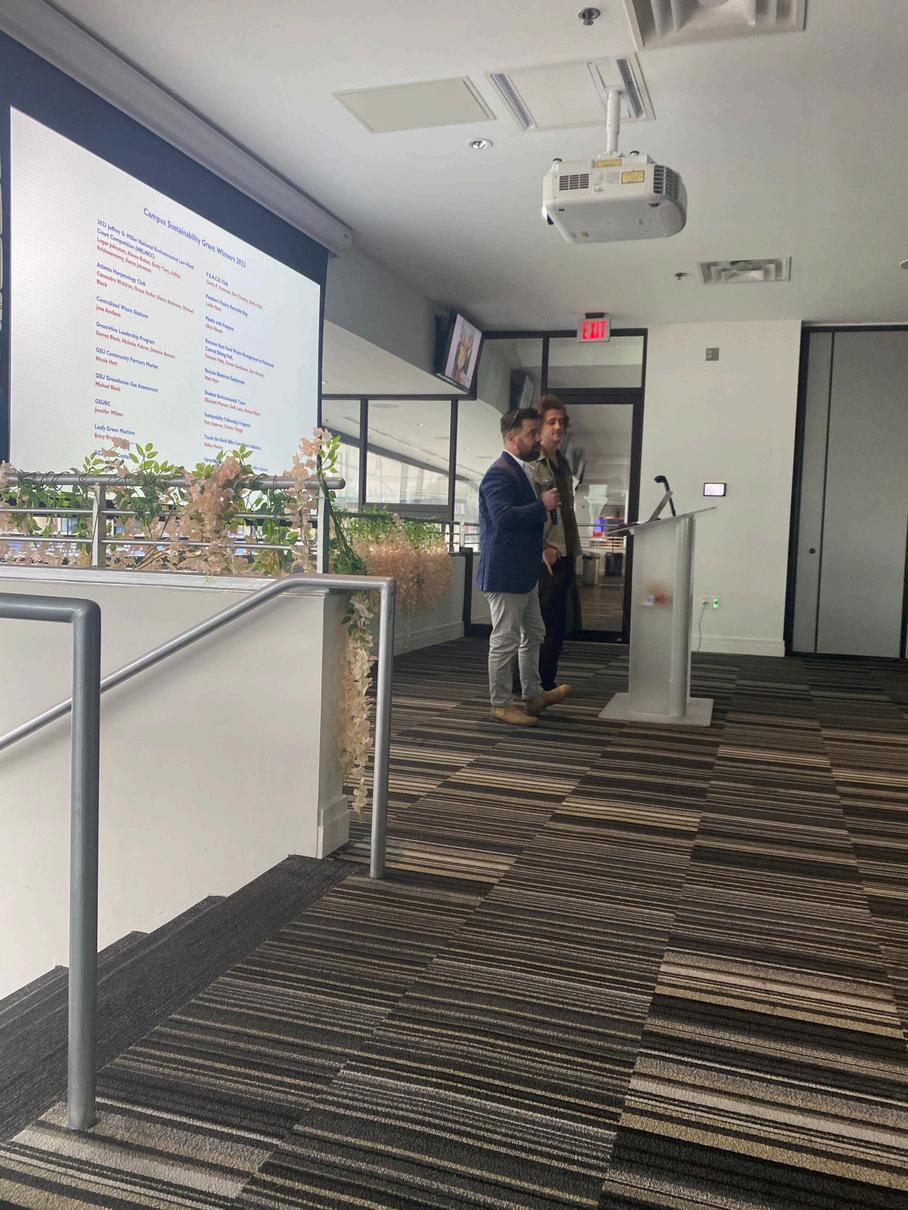
Georgia State University Staff, in partnership with Sustainability Initiatives, recycled electrical equipment at the Student Center on GSU’s Atlanta campus.
The staff collected electrical equipment from storage locations throughout the campus and the surplus department The items recycled include monitors, printers, landline phones, toner ink, and cartridges.
The grant funds were used to purchase bulk bins to collect the electrical equipment.
The equipment was collected by eWaste ePlanet, a local company that dismantles, refurbishes, recycles, and re-markets electronic waste.
E-waste accounts for only 2% of trashed items in America but is responsible for 70% of the toxic waste produced. Only 12.5% of e-waste is currently recycled nationally.
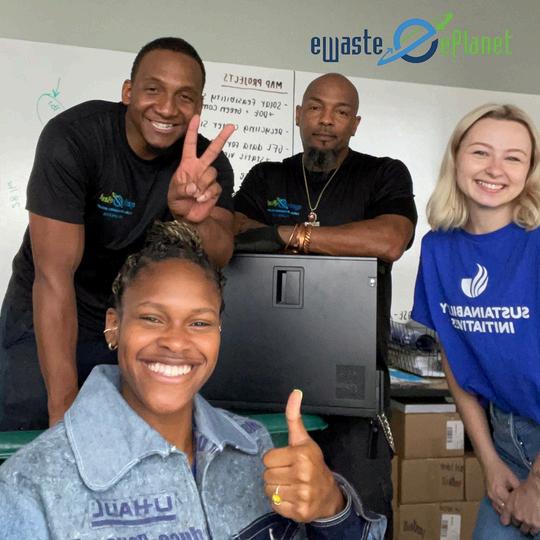
Sustainable Development Goals
SDG 11: Sustainable Cities and Communities
SDG 12: Responsible Consumption and Production.
Recycling electrical equipment prevents toxic chemicals and hazardous materials from entering the landfill, creating a more sustainable community for everyone
Buildings and Materials: Recycling electrical equipment reduces greenhouse gas emissions.
Electronics are hard to recycle. By offering electronic waste solutions at GSU, we’re able to expand recycling efforts far beyond our centralized waste stations.
Additionally, recycling electrical equipment creates more accessible physical and social places for staff and faculty to learn about ewaste recycling at GSU.
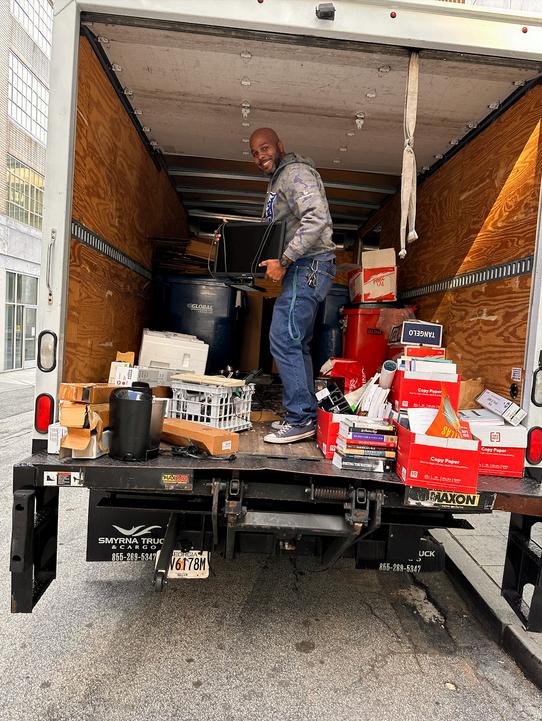
Amount awarded: $700
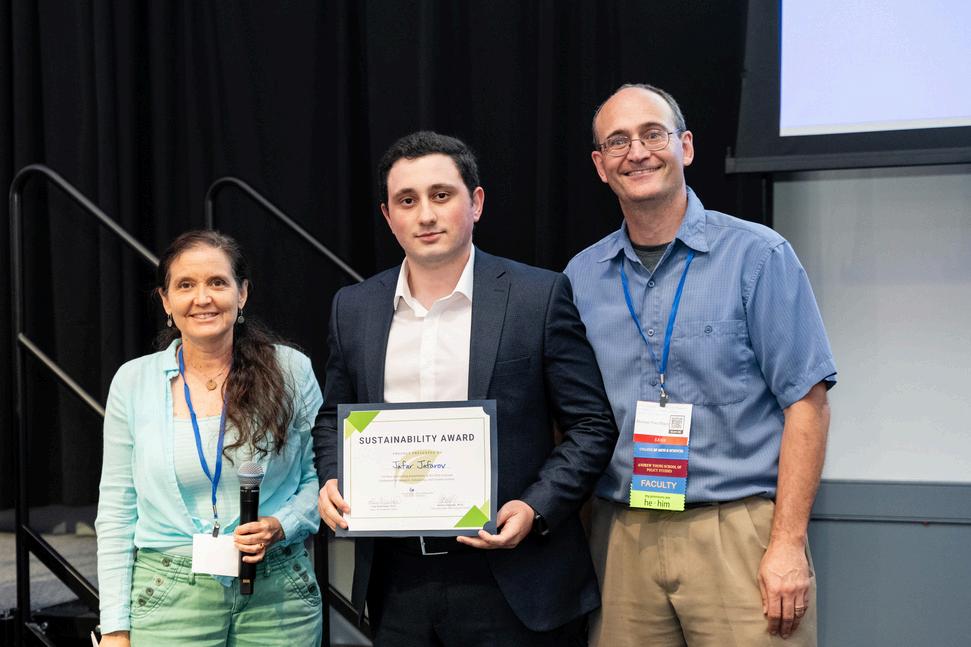
The Graduate Conference for Research, Scholarship, and Creative Activity is a yearly event held in the fall by the Graduate School to allow graduate students to display their work and research.
The theme for the second annual conference was “Innovation through Scholarship.”
The top seven winning sustainability research projects were given cash prizes of $100 each.
Key to Sustainable Clean Up of the Environment: Functional Characterization of Effective Anaerobic Plastic Degradation by Geotalea daltonii by Christina Kiessling
Black Women’s Resistance to Land Domination: Emancipation to Cop City by Safiya Miller
Identification of underground radon hotspots and forecast to future scenarios through space-time pattern analysis by Sumya Tasnim
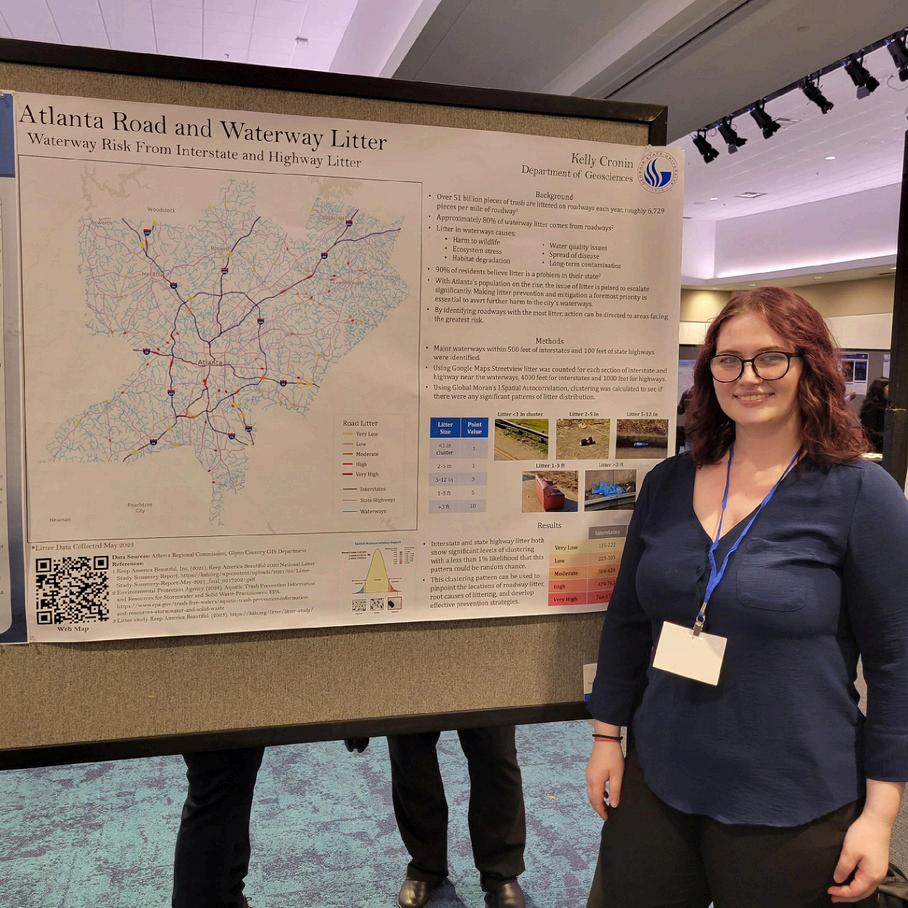
s
Solid Waste Authority Landfill by Andrews Dwumoh
Air Pollution and Time Use: Evidence from India by Jafar Jafarov
Atlanta Road and Waterway Litter: Waterway Risk Determined by Interstate and Highway Litter Data by Kelly Cronin
Democratizing Electric Cooperatives for Environmental Justice by Logan Johnston
The conference gives graduate students the opportunity to showcase their research. They may present their research through artist talks, artistic and creative presentations, film, musical performances, oral presentations, or poster presentations.
The conference equips graduate students for future careers in their field by providing opportunities to conduct research with professionals, develop problem-solving abilities, and enhance public speaking skills
Steven Black Amount awarded: $26,778
The GSU GreenHive Cohort was a 10-week workforce development and leadership program with the Fruitful Community Foundation. Students developed relationships with industry leaders, cultivated leadership skills, and proposed a legacy project to advocate and design better urban landscapes.
Students also helped GreenHive leaders develop future goals for the program.
The grant funds were used to pay for personnel, student stipends, and miscellaneous expenses.
Since the end of the program, some students have continued to work with the Fruitful Community Foundation, leading “green library tours” at Dekalb County Libraries, and one student is continuing their internship with the Fruitful Community Foundation’s for-profit partner, Roots Down.
Sustainable Development Goals:
SDG 3: Good Health and Well-being
SDG 11: Sustainable Cities and Communities
SDG 12: Responsible Consumption and Production
SDG 13: Climate Action
The cohort focused on reducing GSU’s reliance on “mow and blow” and fertilizers made from fossil fuels during landscaping.
Research and Innovation:
GreenHive allowed students to be campus innovators by researching and creating GSUcentered proposals to make the University more sustainable.
College to Career:
Students were trained on how to design and implement a community-based advocacy and intervention program, which provides experiences for their future careers.
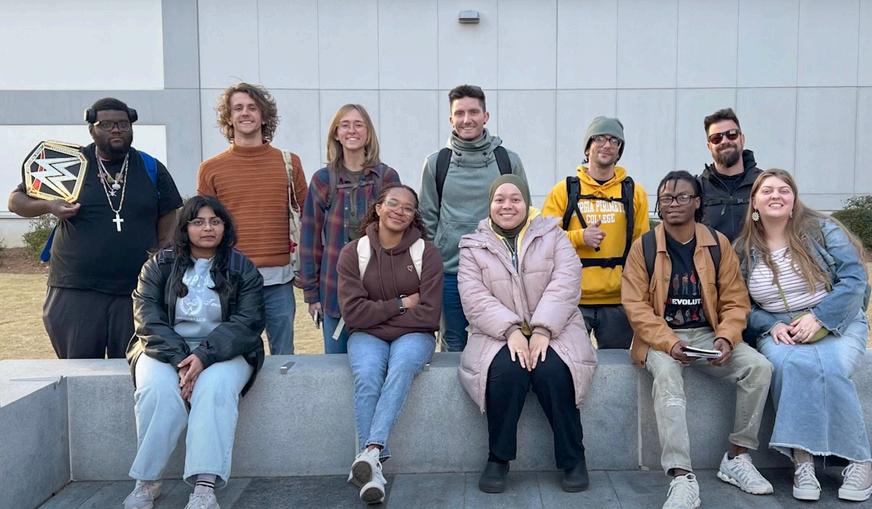
The members of the cohort were:
Yosef Ayala
Deionte Benson
Olivia Dhandhayuthapani
Lauren Fields
I’ona Freeman
Nicholas Fuhrer
Julia Maxwell
Nadia Smith
John Wilson
Teddy Woodson
Julia Simonsen, Hyesu Im Amount awarded: $10,000
Sustainability Initiatives completed its first annual greenhouse gas inventory for GSU’s Atlanta Campus for the 2023 fiscal year.
A greenhouse gas inventory is a detailed collection of emissions from various sources within an organization. There are three different types of scope emissions; scope one emissions are caused by sources that are controlled or owned by the organization, scope two emissions represent purchased electricity, and scope three emissions are caused by factors indirectly influenced by the organization, i.e., commuting, wastewater, etc.
Sustainability Initiatives Intern Julia
Simonsen gathered data related to scope one emissions, such as vehicle fuel purchased for university vehicles and natural gas consumption Scope two emissions were limited to electricity purchased from the grid. Julia also completed a partial scope three emissions inventory by documenting faculty and staff air travel, study abroad passenger miles, the amount of waste landfilled, and the gallons of wastewater released. She then documented the tons of compost collected from the dining halls to use as an offset in the greenhouse gas emission inventory.
Graduate student Hyesu Im conducted research into the best ways of collecting student and employee commuter data, which normally comprises the bulk of scope three emissions
Due to time constraints, the inventory is partial with some data from scopes one and three not available.
As a result of this research, GSU will be able to begin to account for commuter emissions in future inventories.
Sustainable Development Goals
SDG13: Climate Action
Research and Innovation
The research conducted by Julia and Hyesu helped GSU conduct its very first greenhouse gas inventory and paved the way to conduct future greenhouse gas assessments.
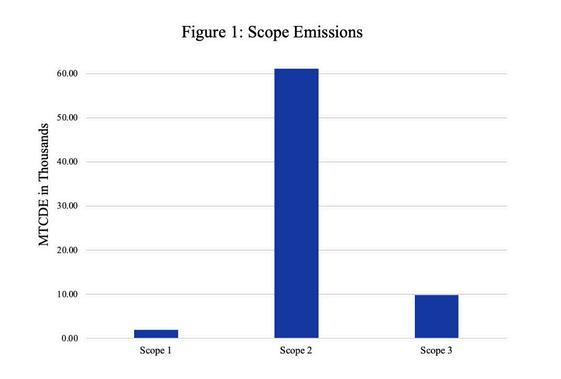
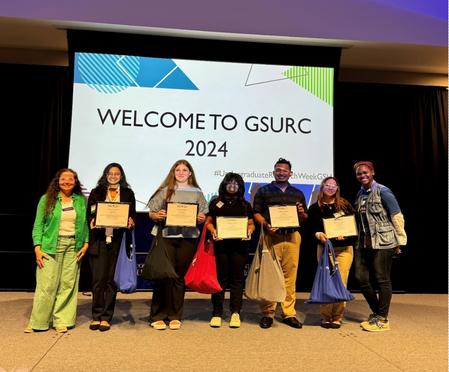
GSURC, the Georgia State Undergraduate Research Conference, is an interdisciplinary undergraduate research conference that highlights and recognizes the research taking place across campus. Each year, undergraduate students are invited to submit their scholarly and creative projects as posters, oral presentations, and artistic or creative presentations
The top seven winning sustainability research projects were given sustainability swag bags full of re:loom products and were invited to the first annual Green Gala.
Are Latinx Communities Vulnerable to Toxic Releases in Atlanta, GA? by Aaron Pacheco Environmental Justice and Diversity, Equity, Inclusion, & Justice within U.S. Env NGOs by Diana Harden River Herring Project by Josseirys Valentin Rivera
Messi in Miami: Unraveling the Environmental and Socioeconomic Impacts of a Football Icon‘s Transatlantic Journey by Avishek Sengupta
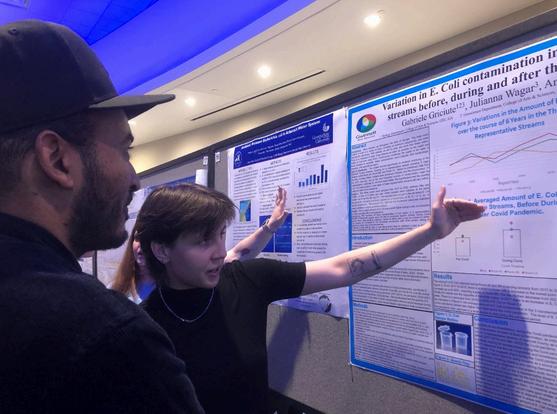
Antibiotic Resistant Escherichia coli in Atlanta’s Rivers and Streams by Madison Gordon
Variation in E. Coli contamination in the Gwinnett County streams before, during and after the Covid pandemic by Gabriele Griciute
Sustainability in the Fizz: An Analysis of CocaCola’s Business Perspective & Sustainability Approach by Isabella Rodriquez
GSURC gives students a platform and audience to showcase meaningful research they've conducted. The students also received great help and guidance from their faculty advisors and external industry professionals.
Completing research alongside industry professionals and faculty advisors helps promote college to career readiness by opening doorways for students to identify problems, data, and research necessary to solve problems.
Logan Johnston Amount awarded: $3,868
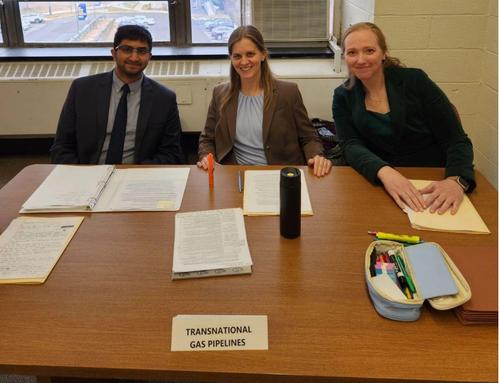
prepare a brief to argue in a hypothetical appellate case for either the petitioner or the respondent.
The grant funds were used to send the GSU Environmental Moot Court Team to New York to participate in the 2024 Jeffrey G. Miller National Environmental Law Moot Court Competition, the largest environmental moot court competition in the country. The funds paid for transportation, housing, and food.
The topic for 2024 involved energy generation and transmission, attempting to balance the values of pipeline development and environmental and religious concerns. The legal challenge involved a proposed natural gas pipeline that would be built on land owned by a citizens’ religious group that believes the harms will outweigh the economic benefits.
The members of the 2023-2024 GSU Environmental Moot Court Team are:
Aditya Krishnaswamy
Aimee Risher
Emily Toto
Logan Johnston
College and Career
Members of the moot court team were able to gain valuable out-of-classroom learning experience from engaging with peers from other universities and industry professionals in environmental law.
Research and Innovation:
To prepare for the competition, the students researched real case law and environmental regulation to write a brief and prepare arguments
Student Success:
The GSU Environmental Moot Court Team made it to the semifinals and placed 9 out of 54 schools. One member, Aimee Risher, won best oralist in the third round of oral arguments
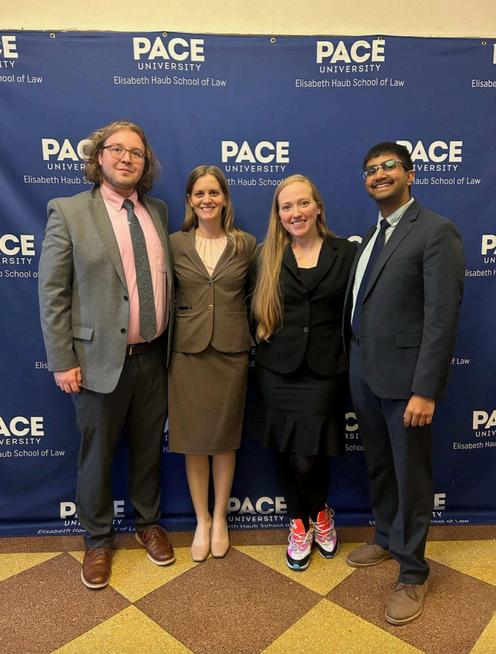
Davis Roberts
The Leafy Green Machine, also known as the freight farm, is a year-long hydroponic farm. Hydroponics is a type of horticulture where you grow plants with a water-based nutrient solution instead of soil
Produce grown at the farm is used at the dining halls and Panther’s Pantry. In the 2023-2024 school year, approx. 225 lbs. of produce was grown for the dining halls and Panther’s pantry.
The farm was able to donate produce to GSU catering and the Department of Nutrition’s Preceptor Appreciation Day.
The Leafy Green Machine has provided tours and lectures educating participants on the hydroponic process, the differences between conventional and hydroponic farming, and the sustainability initiatives taking place on GSU’s campuses
The grant funds were used to pay for student stipends, nutrients, chemicals, seeds, and miscellaneous supplies.
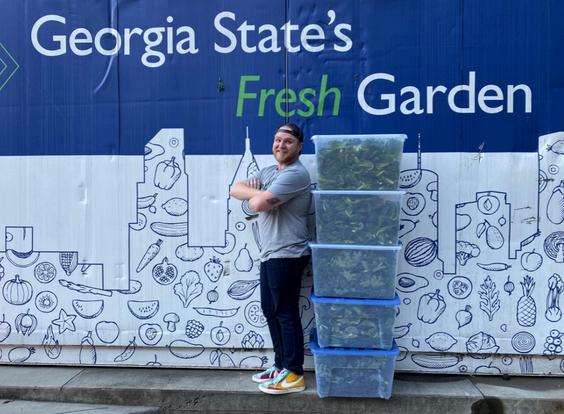
Amount awarded: $17,075
Sustainable Development Goals
SDG 2: Zero Hunger
SDG 12: Responsible Consumption and Production
Hydroponic farming produces less water waste, requires less space than industrial farming, and doesn't require soil, pesticides, or herbicides.
Research and Innovation:
In collaboration with the nutrition department, the freight farm researched and advanced hydroponic agriculture techniques to successfully grow new vegetables beyond leafy greens. The new vegetables include tomatoes, cucumbers, kohlrabi, bok choy, mizuna, and microgreens.
College to Careers:
The farm provided out-of-classroom learning for students from various disciplines, including journalism, business, nutrition, chemistry, and geography. The farm also provided three job opportunities for students and two internship opportunities for graduate nutrition students.
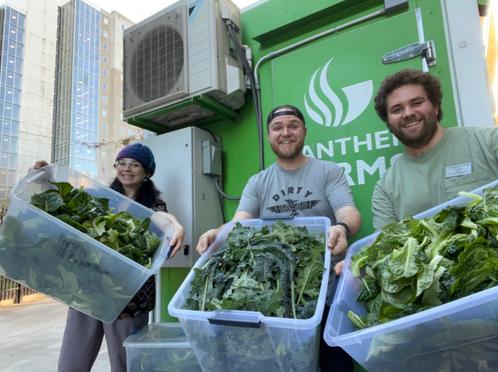
Leslie Mack Amount awarded: $15,000
Panther's Pantry was established in 2014 by graduate students from the coordinated program (CP) in the Nutrition Department. Their mission is to distribute food and basic necessities to the Georgia State University community to alleviate the stress associated with short-term food insecurity and other financial constraints in order to effectively reduce hunger and improve student success. In the fall of 2018, Panther’s Pantry under the GSU Foundation became a 501c3 non-profit organization and is now a partner agency with the Atlanta Community Food Bank.
Panther Pantry used its grant funds to purchase 5,000 reusable food bags and 5,000 reusable hygiene bags. When ordering from the pantry, students, faculty, and staff can choose between a standard food bag, a vegetarian bag, and a hygiene bag.
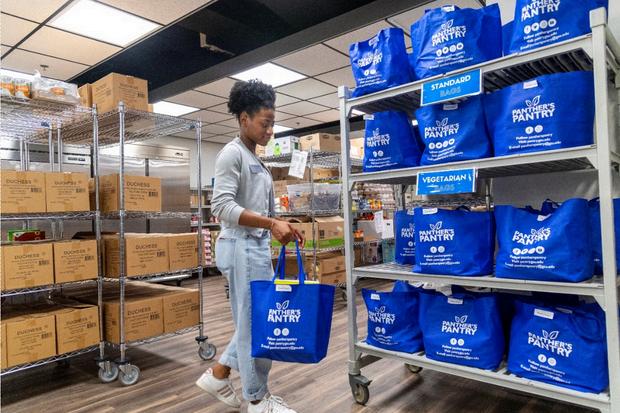
Drawdown Georgia
Food & Agriculture: The pantry uses donated food decreasing the amount of food wasted. Building & Materials: The pantry uses reusable bags decreasing the use of single-use bags.
Annually, Panther’s Pantry distributes over 40,000 lbs. of food and hygiene products to over 3,500 visitors.
Student Success
Panther’s Pantry provides short-term support for students to improve academically.
On average, students who used the pantry had a higher GPA of 0.16 points and a 13.1% higher progression, retention, and graduation rate than students who did not use the pantry.
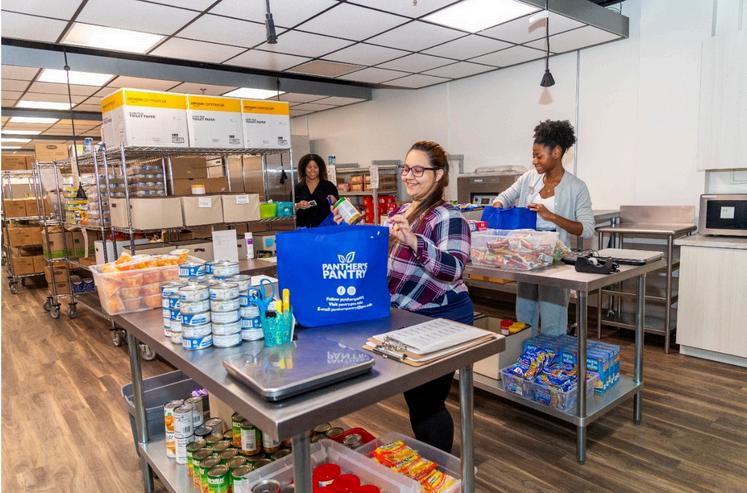
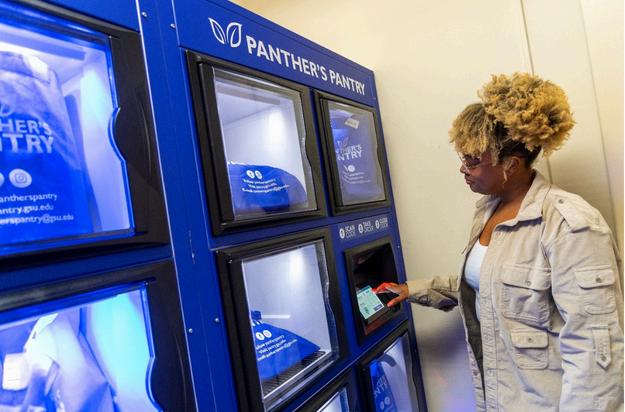
OZZI containers are reusable to-go food containers that allow meal-plan holders to take food outside of the dining halls. PantherDining first introduced OZZI containers to the dining halls in the fall of 2021.
OZZI containers help reduce the amount of single-use plastic and Styrofoam to-go boxes that would end up in the landfill and ensure students can access food at any given time.
PantherDining used the grant funds to purchase an additional 200 OZZI containers that are blue and have Pounce on the front.
Sustainable Development Goals
SDG 12: Responsible Consumption and Production
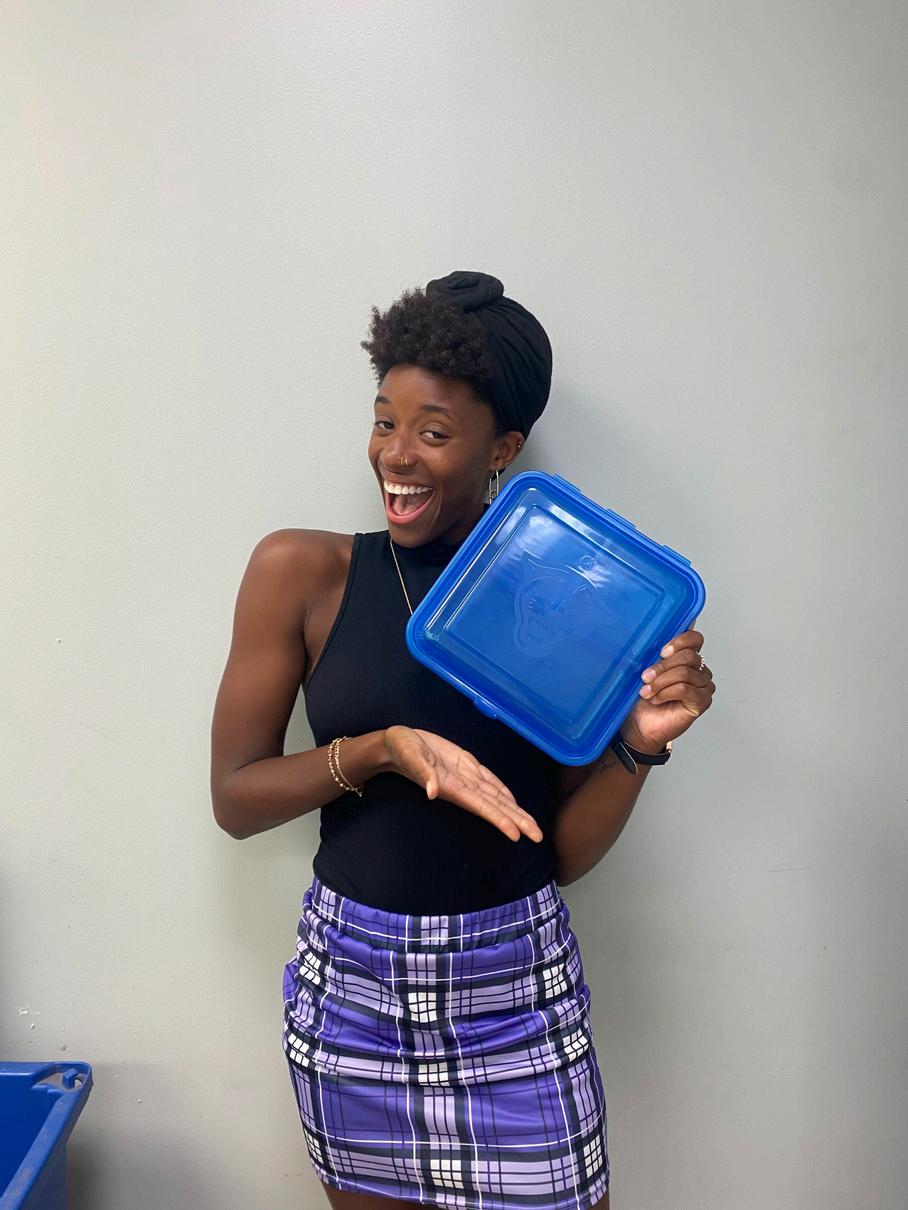
By using OZZI containers, the university is able to reduce their environmental footprint.
$15,000
Re:loom is a nonprofit in Decatur, GA, that employs homeless and low-income individuals through weaving one-of-a-kind products from second-hand clothing and materials.
PantherDining partners with re:loom to upcycle old PantherDining uniforms. This year, more than 100 lbs. of clothes were collected from PantherDining to upcycle with re:loom.
The grant funds are used by Sustainability Initiatives to purchase the upcycled products to give out to students as Sustainability SWAG at events.
The upcycled product line was expanded this year to include dog leashes, yoga mat straps, laptop cases, cross-body bags, and more
Sustainable Development Goals
SDG 12: Responsible Consumption and Production
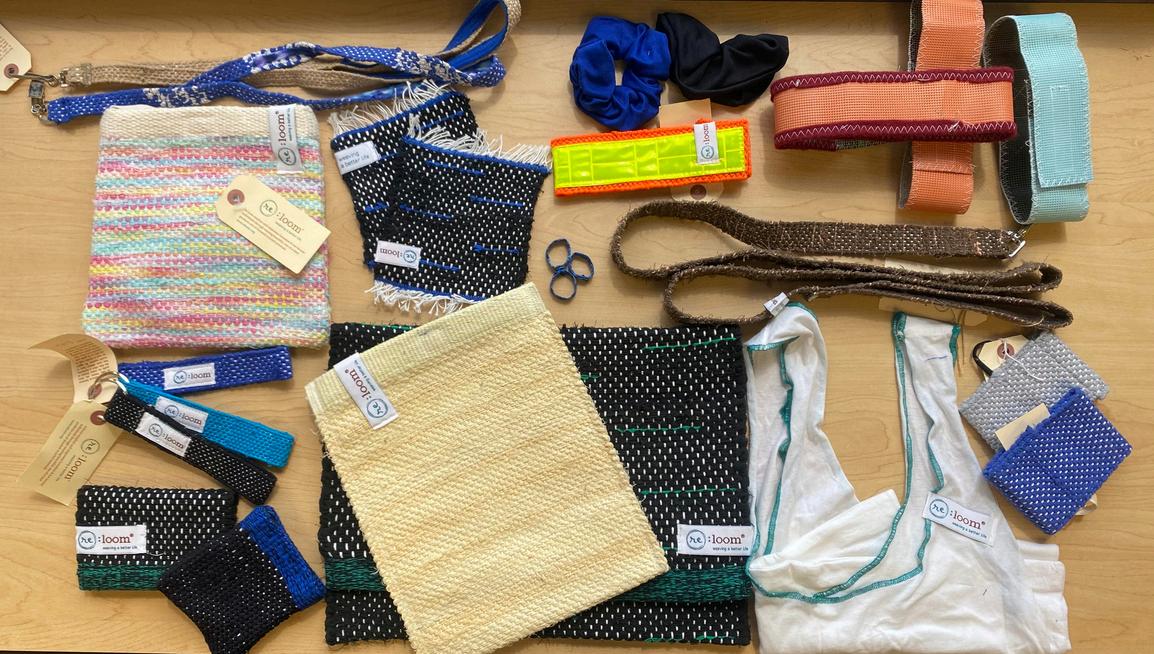
Lucero Mendez Amount awarded: $1,500
PantherSWAP is an initiative where students have the opportunity to donate old clothes, dorm decor, school supplies, etc. and “swap” them for other items. This creates a circular economy where nothing goes to the landfill, closing the loop of waste from students.
Students are able to participate in PantherSWAP and receive items at no cost.
In collaboration with the Residence Hall Association, PantherSWAP held its first pop-up shop on April 28 at the Piedmont North courtyard. The pop-up shop received donations from 15 students, allowing 52 lbs. of clothes to be diverted from the landfill.
The grant funds were used for a student
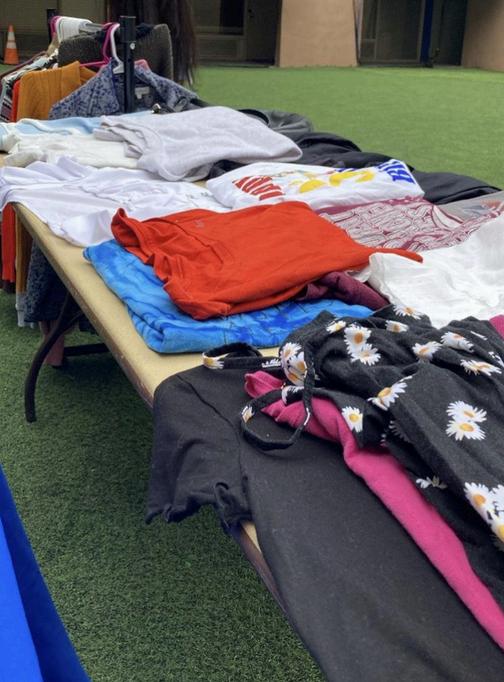
Sustainable Development Goals
SDG 11: Sustainable Cities & Communities
SDG 12: Responsible Consumption & Production
Identity and Placemaking
PantherSWAP builds a stronger community and identity within the university by providing a form of mutual aid between students, while bringing the inclusivity and joy of thrift culture to campus.
Student Success
PantherSWAP is a student created and led program by Lucero Mendez This initiative originated as a proposal for a classroom assignment and Lucero submitted the proposal, making PantherSWAP a reality.
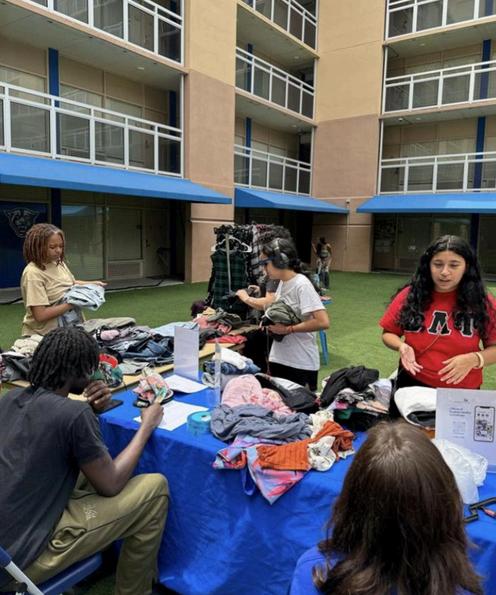
Carrie Freeman
PEACE Club (People for the End of Animal Cruelty & Exploitation) is a student organization that focuses on plant-based eating, animal advocacy, social justice, and environmental justice. During the school semester, the PEACE Club hosts many events such as cooking demos, documentary screenings, and activist demonstrations to promote veganism and bring awareness to animal cruelty.
PEACE Club used its grant funds to purchase logo-branded stickers and buttons, informational handouts, and plant-based grocery items for their campus events.
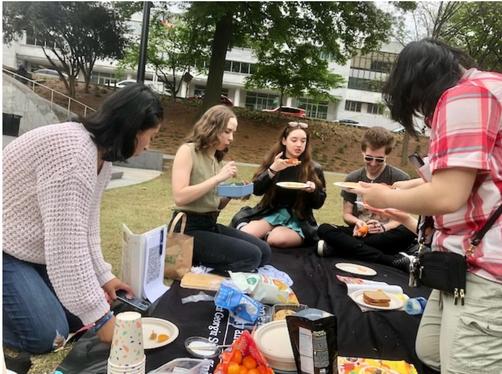
Identity and Placemaking: Peace Club is the only vegan and animal rights advocacy group at Georgia State University allowing a place for friendships and support to be forged between students.
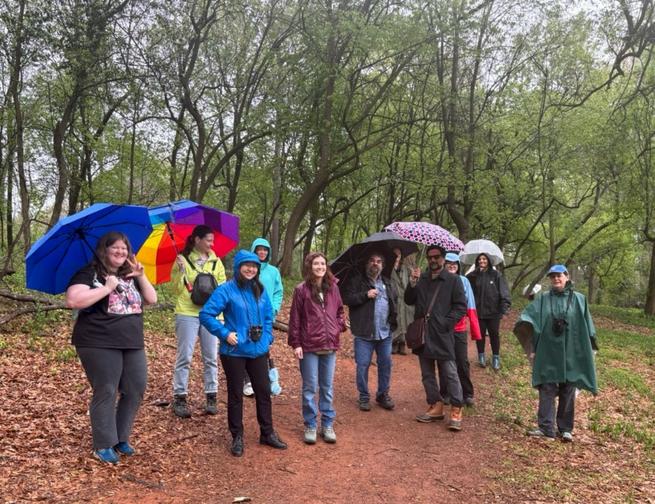
Amount awarded: $1,750
Sustainable Development Goals:
SDG 3: Good Health and Well-Being
SDG 12: Responsible Consumption and Production.
When planned properly, vegan diets provide all the nutrients needed for a healthy lifestyle and reduce the risk of different types of chronic diseases
At events, the PEACE Club tries to be as sustainable as possible by using compostable plates, napkins, and utensils, and composting them along with food scraps.
Drawdown Georgia: Food and Agriculture: PEACE Club provides plantbased food at events and promotes plant-based diets.
College to Career: PEACE Club educates students on eco and animal issues within the context of social justice so students can be more thoughtful and informed when communicating these issues in their future
Alicia Blount Amount awarded: $8,670
Plastic with Purpose was developed for students to create artwork from hard-torecycle plastic materials.
Plastic with Purpose was inspired by a GSU Graduate’s research project that highlighted the billions of metric tons of pre-and postconsumer plastic waste that is generated every year. Throughout the semester, Plastic with Purpose held six upcycling workshops where students created functional art creations from plastic waste.
Three workshops were led by student workshop leaders: Jodie Kamdoum, Yen Tran, and Justin Abraham.
Jodie Kamdoum led a workshop where they transformed pill bottles and plastic bottles into a plastic flower bouquet.
Yen Tran led a workshop where they created hair accessories out of fabric scraps, cardboard, and bottle caps
Justin Abraham led a workshop where they created pot planters from water jugs.
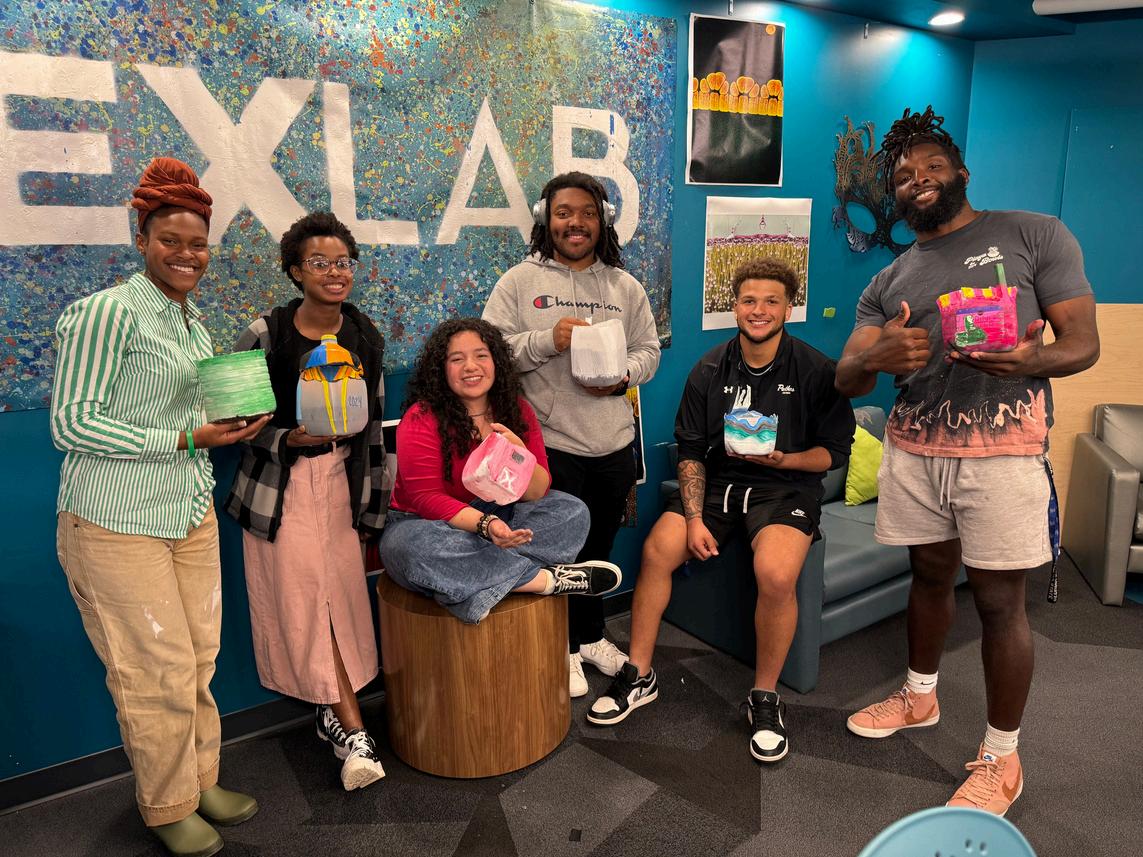
The grant funds were used to pay student personnel and purchase miscellaneous materials.
Sustainable Development Goals
SDG 4: Quality Education
SDG 11: Sustainable Cities and Communities
SDG 12: Responsible Consumption and Production
The workshops kept plastic waste out of the landfill by repurposing the waste while educating the GSU community about plastic pollution and recycling.
Student Success
Student workshop leaders gained creative thinking, leadership, responsibility, and time management skills.
Research and Innovation
Plastic with Purpose aimed to create art from hard-to-recycle materials, promoting more efficient use of resources and reducing landfill waste
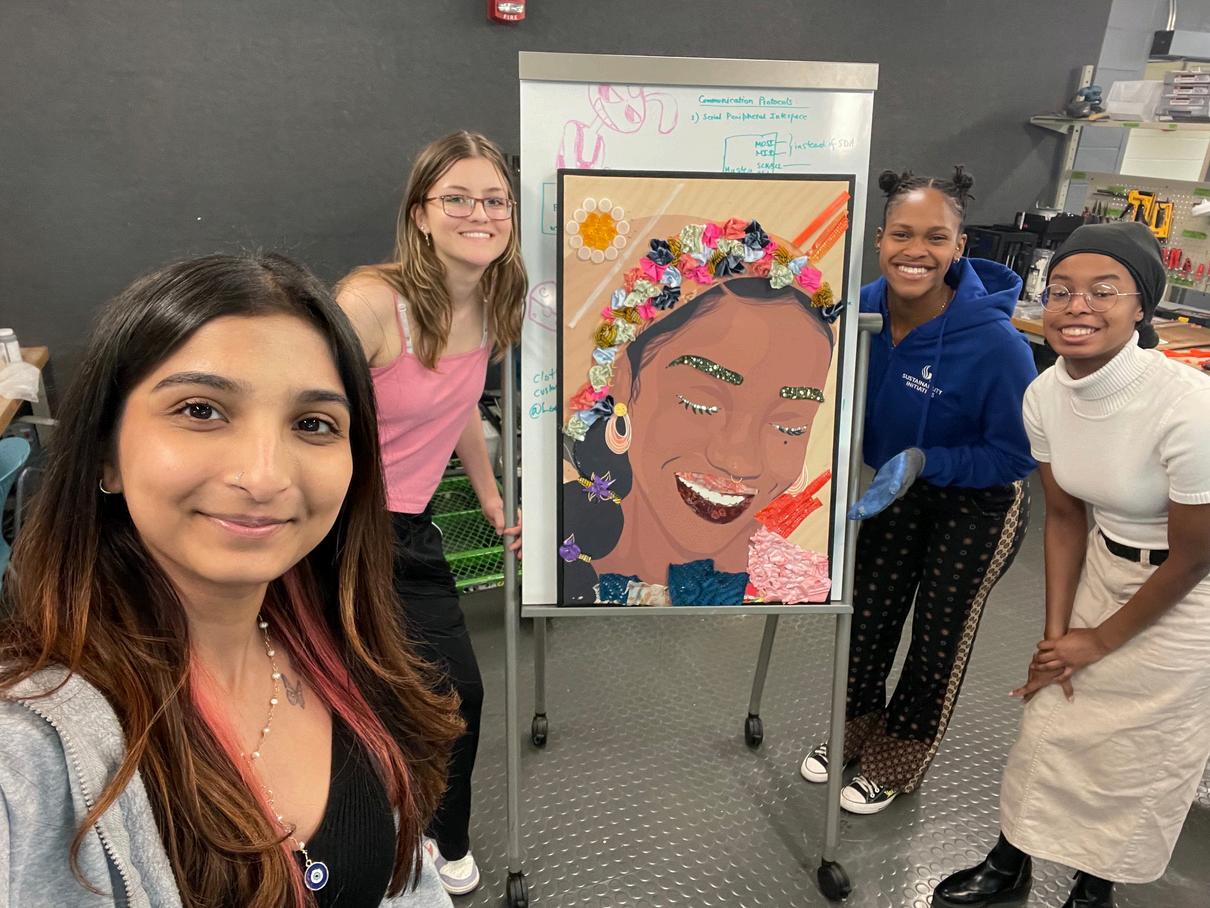
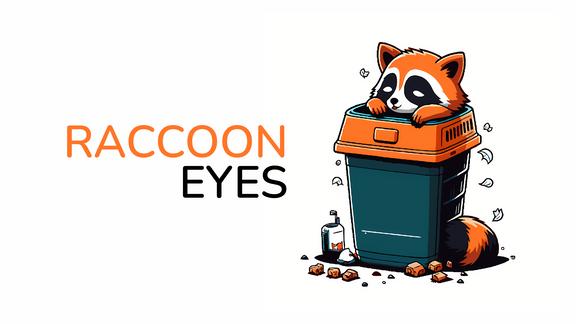
Connie Santibanes, Erin Murphy
Raccoon Eyes is a food management waste system. Raccoon Eyes reduces food waste by using AI technology to scan food waste at dining halls and student feedback. Dining halls can use the data and feedback to make the most effective changes to reduce food waste, whether it be refining recipes or changing portion sizes.
Raccoon Eyes was installed at the Piedmont Central dining hall on GSU’s Atlanta Campus at the beginning of the 2024 Spring semester. Over the semester, there were 22,626 2 lbs of food wasted, equivalent to $26,472 65 The most wasted foods were fries, chicken, and fruit, with most students' feedback stating they put too much on their plates.
Throughout the semester, food waste decreased by 23%, and dining hall sentiments and sustainability goals increased by 58%.
The grant funds were used to purchase and install the technology.
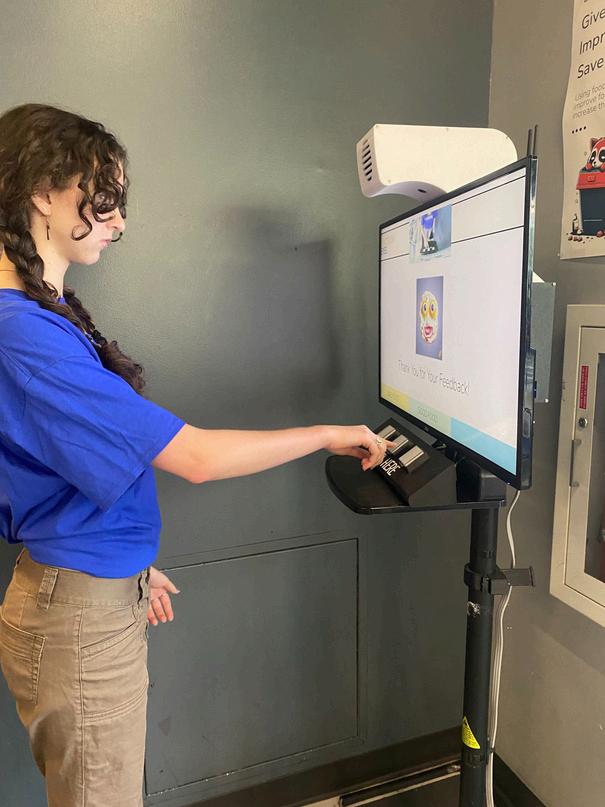
Amount awarded: $4,850
SDG9: Industry, Innovation and Infrastructure
SDG11: Sustainable Cities and Communities
SDG12: Responsible Consumption and Production
SDG13: Climate Action
Raccoon Eyes aims to reduce climate change and make communities more sustainable by reducing food waste.
Georgia State is one of the first schools that has implemented this technology, allowing students to get first-hand experience with AI applications GSU has had the opportunity to help lead its growth to universities worldwide.
Raccoon Eyes is a student-driven project that occurred beside a food and sustainability focused internship program. The project promoted college to career readiness by giving the interns the responsibility of researching, proposing, implementing, and overseeing Raccoon Eyes at Piedmont Central’s dining hall.
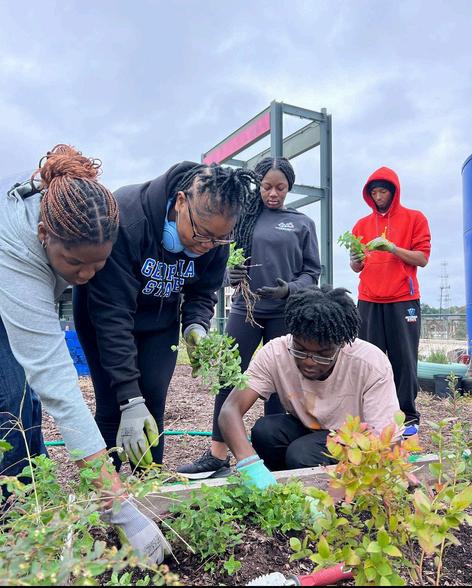
Elizabeth Plumart Amount awarded: $2,025.59
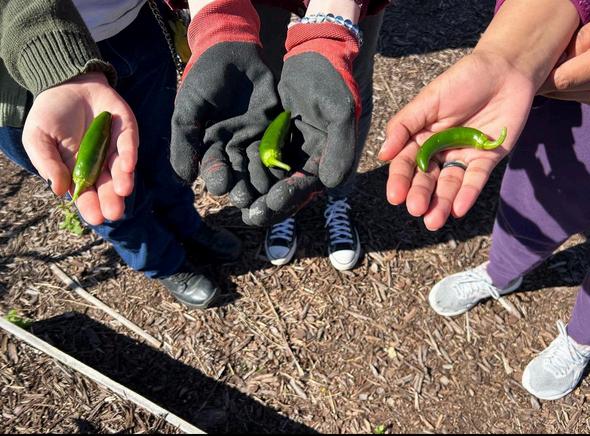
The Student Environmental Team is a student organization that promotes sustainability on campus through volunteering, education, and the enjoyment of nature.
SET operates an outdoor garden on the rooftop of Center Parc Stadium They grow various vegetables, fruits, and native plants, like blackberries, strawberries, peppers, and sunflowers. The garden serves as an educational space to teach members and volunteers about urban gardening practices, and the produce is donated to Panther’s Pantry.
The grant funds to purchase materials to support the operations of the garden. They purchased archways, planters, pots, tomato cages, and various plants.
SET hosted 15 garden volunteer events from January 2024 to May 2024 and collaborated with Plastic with Purpose and Seedlings to convert household items into plant pots
Sustainable Development Goals
SDG 11: Sustainable Cities and Communities
The rooftop garden is an example of a sustainable, local food system, which is vital to the success of building resilience and sustainability in cities.
Food and Agriculture: The rooftop garden has four composters where all organic waste is deposited, creating a rich and natural fertilizer for the plants, which reduces greenhouse gas emissions.
When working in the garden, individuals gain useful skills, preparing them for a career in a sustainability or horticulture-related field.
and Placemaking:
Despite the garden being in a busy stadium, the garden brings a sense of calmness and tranquility to visitors, creating a communal space for members of the GSU community
Christy Visaggi Amount awarded: $60,000
The Sustainability Fellowship Program (SFP) supports internships for undergraduate students across all disciplines at GSU and reduces the financial burden associated with these career preparation opportunities in the local, regional, and national sustainability sectors. The program allows students to pursue work experiences where they will apply and develop their analytical, research, and communication skills in a professional setting.
The SFP provided 4 mini-grants and supported 21 fellows and 2 student cocoordinators to run the program with a total of $60,000 in Fall 2023, Spring 2024, and Summer 2024. The fellows represented GSU at 12 different internships, on and off campus As part of the SFP, all fellows completed one professional development event.
Research and Innovation
Many students receive internships to complete research projects, therefore gaining valuable research experience. Some areas of research from Spring and Summer 2024 fellows include water quality, climate change, and conservation.
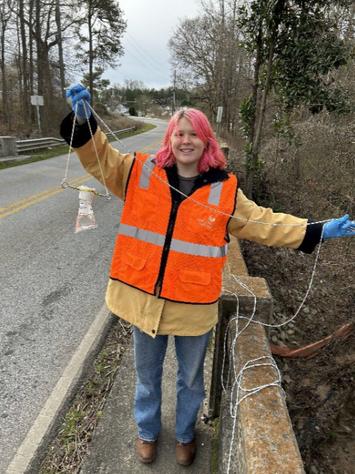
Internship Locations
American Rivers
Captain Planet Foundation
Chattahoochee Riverkeeper
City of Atlanta – Department of Watershed
Management
Environment America
Fernbank Science Center
Georgia State University – Geosciences Department
Paleoclimate and Climate Change Lab
Conservation Paleobiology Lab
Urban Hydrology Lab
Political Ecology and Environmental Justice Lab
Clay Mineralogy and K-Ar Geochronology Lab
Gwinnett County Government
Robin’s Nest Nature School
Savannah River Environmental Sciences Field Station
South River Watershed Alliance
U S Forest Service
“It's given me a solid foot in the door in terms of a stable career after I graduate next year”
-- Liam Burns, 2023 Fellow
Fall 2023 Fellows
Lucy Hopwood
Alexander Rasmussen
Latasia Watkins
Cristal Valdez
Spring 2024 Fellows
Liam Burns
Eric Cormier
Christopher Gray
Lucy Hopwood
Anna Jarrell
Finn Shuster
Nina Strudwick
Co-Coordinators
Olivia Kirkland
Annabelle Sanders
Summer 2024 Fellows
Emily Archer
Stefan Daniel
Josef Franco
Monserrat Hernandez
Drew Hopper
Eliana Morales
Hazel Pepperman
Elle Shirah
Riley Thompson
Sophia Karpoev
Mini-Grants
Skyy Corral
Lucy Hopwood
Elle Shirah
Finn Shuster
Hailey Hester Amount awarded $2,412
Commuter Bike Initiative
Touch the Earth’s Commuter Bike Initiative offers students subsidized bike rentals to reduce barriers of green commuting. The rentals cost $2 for students, $3 for recreation members, and $5 for non-member faculty and staff.
The Commuter Bike Initiative used the grant funds to purchase bike helmets, phone mounts, water bottle mounts, and water bottles for rentals. The funds were also used to maintain and service the bikes
Sustainable Development Goals
SDG 3: Good Health and Wellbeing
SDG 11: Sustainable Cities and Communities
Biking is a sustainable form of transportation in cities and is proven to help mental health and h i l h l h
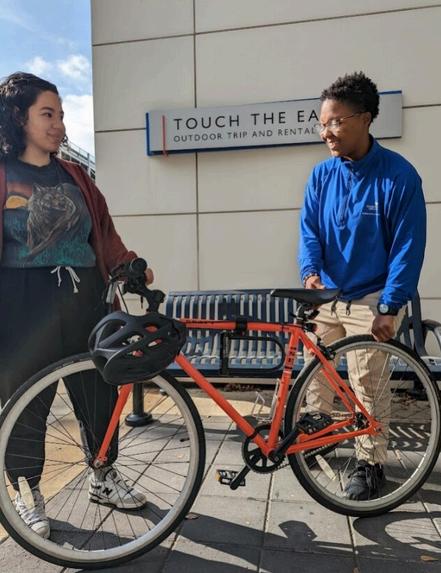
Sustainable Outdoor Closet
The Sustainable Outdoor Closet will provide cold weather gear to individuals who are attending one of Touch the Earth’s outdoor recreational trips.
There has been an increase in attendees who don’t own or have access to cold weather clothing, which is a barrier to some of the recreational trips. The closet will provide cold weather gear free to attendees in need.
The grant funds were used to purchase 10 men’s and 9 women’s tops and bottoms in a range of sizes from XS-XXL.
Sustainable Development Goals
SDG 3: Good Health and Wellbeing
SDG 12: Responsible Consumption and Production.

The establishment of the closet will reduce potential textile waste from individuals who may only need the gear a few times and will ensure that all participants will stay warm and healthy during the trips.
Amount awarded: $52,100

Alicia started her work as an Engagement Coordinator in Spring 2023. Her role includes overseeing social media and marketing interns, coordinating events such as Green Move-In and Earth Week festivities, liaising with various organizations, and supporting the implementation of projects like the Campus Sustainability Grant Program and re:loom initiative.
Shambhavi Giri - Graduate Research Assistant
Shambhavi Giri started working as an Intern in Summer 2023 at Sustainability Initiatives and then worked at the office as a graduate research assistant. Some of the projects that she worked on were the FTA’s FY23 Low- and No-Emission funded Panther bus Express Electrification and Zero-emission University Fleet E-mobility plan, and improving Sustainability Initiatives’ website. She graduated with her Master’s degree in May 2024 and is now working towards her Ph.D. Her work focuses on environmental data analysis and modeling.
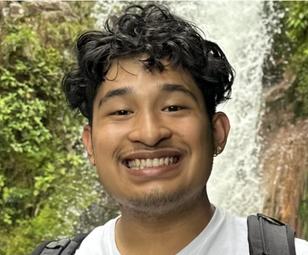
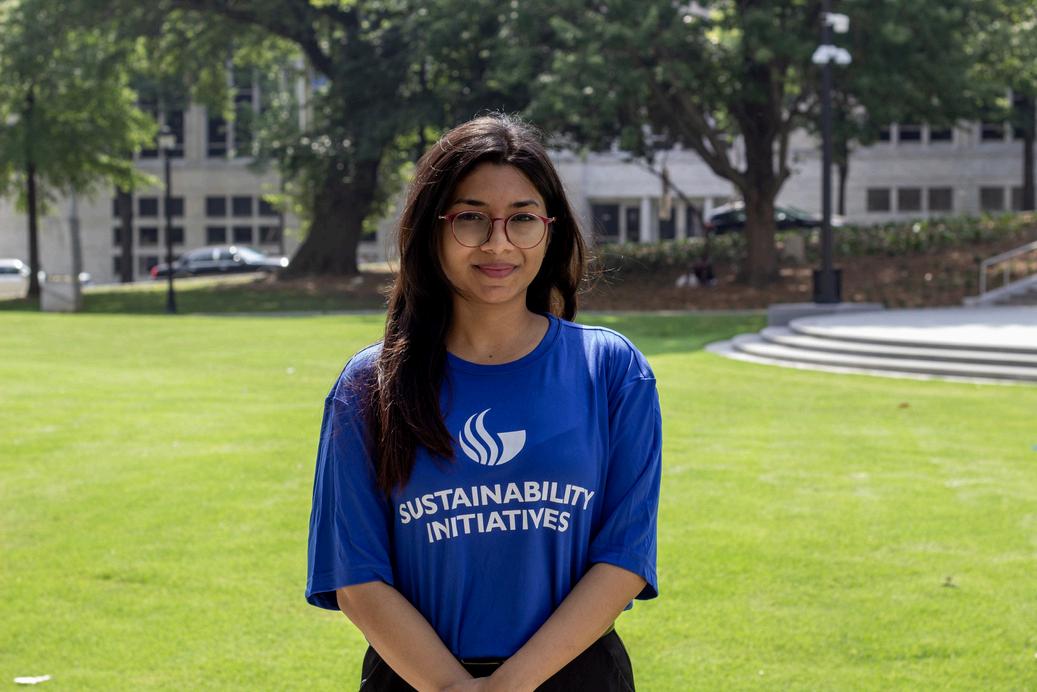
Aaron is a geoscience major and he started his internship in the fall of 2023, working on the Bee Campus USA team. He worked to help GSU’s Decatur campus achieve their Bee Campus USA certification. He created a story map featuring the gardens and green spaces at GSU After he created multiple maps of downtown Atlanta and the Atlanta campus, showing bike routes and alternate commuting routes.
Aditya started his recycling internship in Spring 2024. Aditya collects, sorts, and prepares recyclable materials from university buildings for the various recycling vendors.

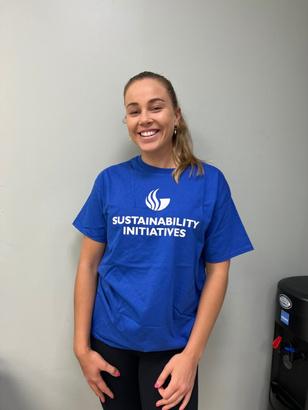
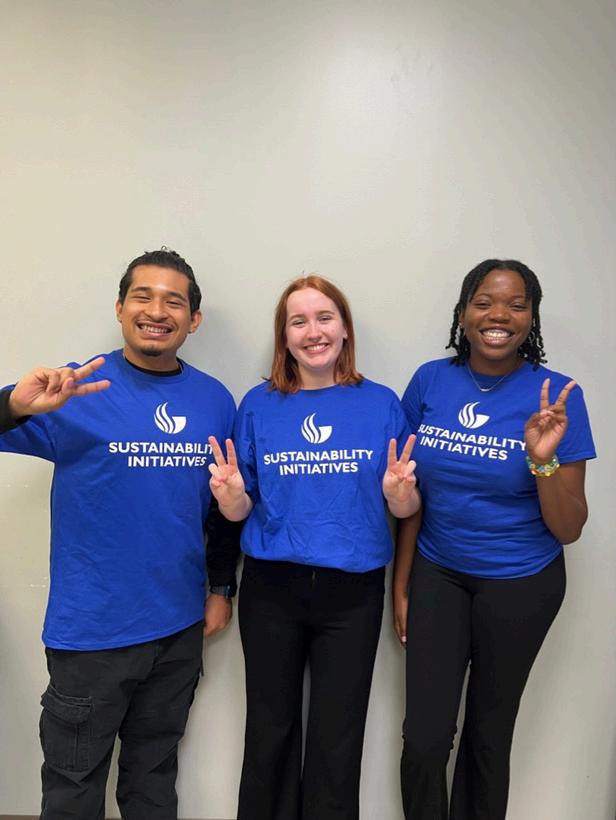
Alissa Vuorinen, Data Analysis Intern, Fall 2023
Aliisa started her internship in fall 2023 by refining waste diversion data that was collected from 2021 to 2023. She used the data collected to craft visual reports that shows the Office of Sustainability Initiatives increasing recycling efforts.
Martin, Marketing & Social Media Intern, Summer 2024
Anaya’s work focuses on creating content for the sustainable instagram and helping plan events hosted by the Office of Sustainability Initiatives. Anaya is pursuing her second bachelors in film and media. As an intern, she said she is able to pusure her passion of filming and is “able to learn something new everyday about sustainability ”
Brianna White, Bee Campus Team, Fall 2023

Brianna worked on the Bee Campus USA team, helping GSU’s Decatur campus achieve their Bee Campus USA certifications. She helped create the gardens and green spaces story map and collected content for the sustainability website Brianna also worked with Leigh and Clinton at tabling events, educating students on GSU’s sustainability initiatives. She graduated in December 2023 with her bachelor’s degree.
Brij Chovatiya - Recycling Ambassador, Summer 2024
Brij is one of the newest recycling interns at GSU. He works at the recycling center at Center Parc Stadium, preparing recyclable materials to be taken to our various vendors. He attended the tour at CHaRM, learning more about hard to recyclable materials.
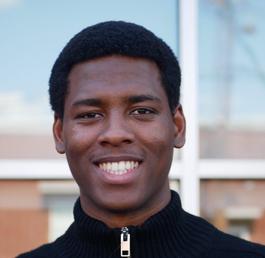
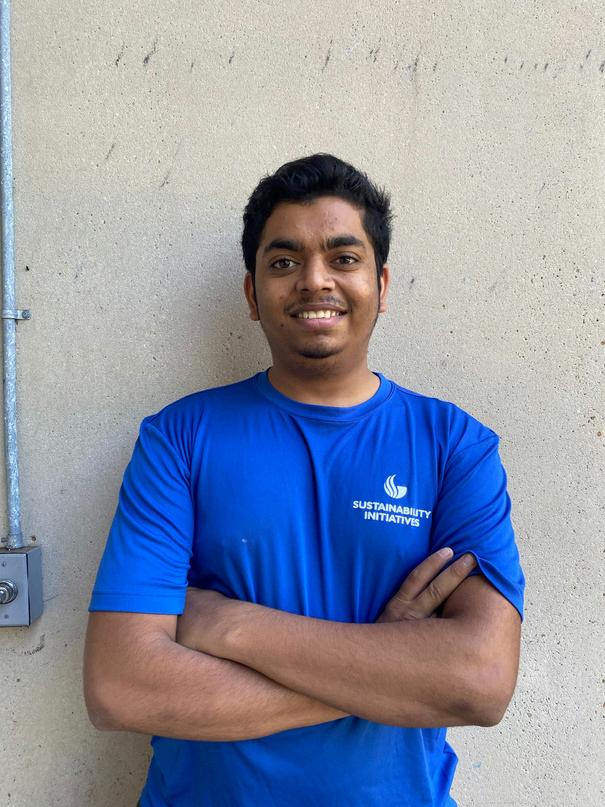
Clinton built centralized waste stations and landfill bins to be distributed throughout the buildings on GSU’s campus. He worked with Leigh and Brianna at tabling events to educate students on different sustainability initiatives at GSU. He also created a sustainability rap song that he performed at the 2024 Green Gala. Clinton said working at the sustainability office has taught him the importance of incorporating sustainable practices in his life.
Connie Santibanes, Food & Dining Intern, Fall 2023
Connie worked with Erin on the Food & Dining team to research ways on reducing food waste at GSU’s dining halls. She helped bring Raccoon Eyes to Piedmont Central. Raccoon Eyes uses AI and student feedback to alter food recipes to reduce food waste. She graduated in May 2024 with her bachelor’s in Computer Science.
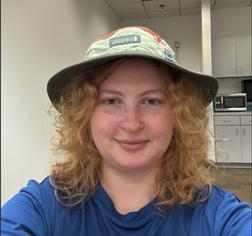
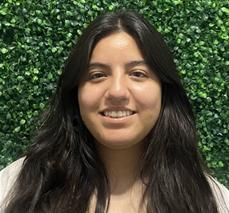
Daley Wittmeyer, GIS Intern, Summer 2024
Daley is one of the members of the Tree Team, helping Sean and Olivia map, label, and measure trees for the tree care plan The tree care plan will help GSU’s Clarkston campus achieve its Tree Campus Higher Education certification from the Arbor Day Foundation. Daley is majoring in environmental science and minoring in anthropology. She has completed her GIS certificate and is currently pursuing her sustainability certificate.
Erin Murphy, Food & Dining Intern, Fall 2023
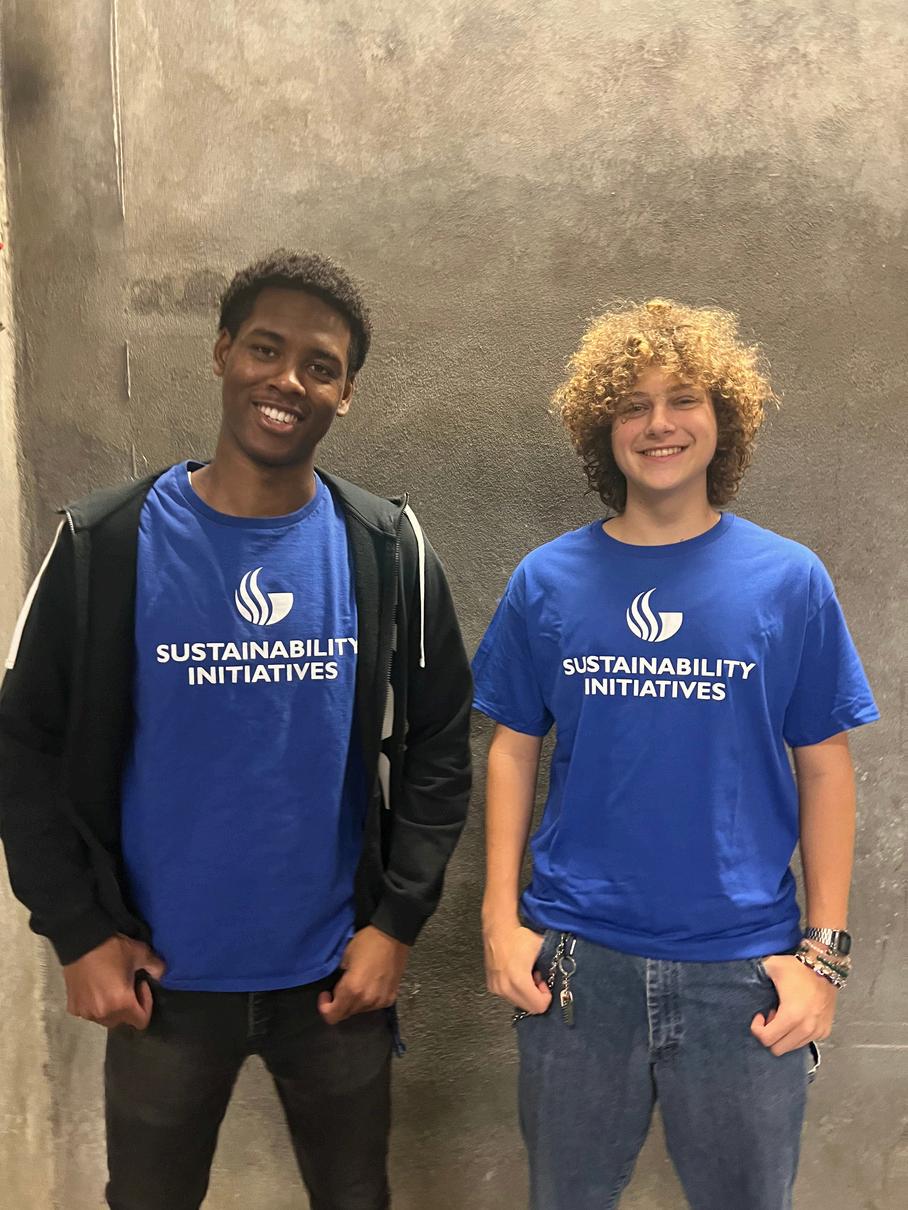
Erin worked with Connie on the Food & Dining team to find ways to reduce food waste at the dining halls. Erin helped bring Raccoon Eyes to the dining halls and helped analyze the data given from Raccoon Eyes. “ I love the friendly atmosphere in the office, researching possibilities for initiatives, and seeing a project come to light!,” said Erin regarding her experience as an intern.

Frank Butler, Recycling Ambassador, Fall 2023
Frank worked with Clinton on the Recycling team to build centralized waste stations and landfill bins to distribute to the different university buildings on GSU’s Atlanta campus.
Jenifer Nguyen, GIS Intern, Spring 2024
Jenifer used GIS to create a virtual tour highlighting the different sustainability resources and programs that GSU’s Atlanta campus offers. Jenifer researched and documented the different resources to create a map that tells the story of the work and progress done to make GSU a more sustainable and green university.
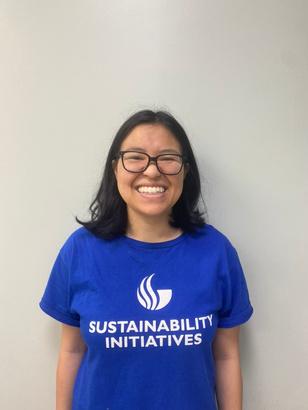
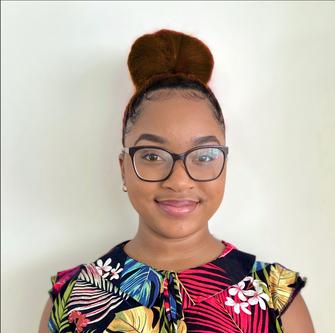
Jasmine Hall - Recycling Ambassador, Spring 2024
Jasmine is one of the members of the Recycling Team. She works at the Recycling Center at Center Parc Stadium, preparing recyclable materials to be taken to our various vendors.
Julia helped GSU’s Decatur campus achieve their Bee Campus USA certification along with Aaron and Brianna. She helped create the story map about GSU’s gardens and green spaces and content for the sustainability website. Julia also worked with Jennifer Wilson and Shambhavi on the greenhouse gas inventory. Julia is majoring in environmental science.
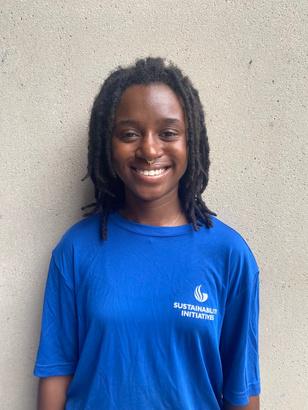
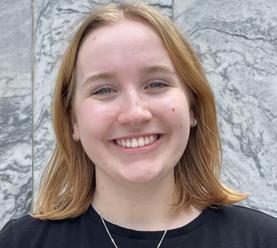
Laila LeRoy, Recycling Ambassador, Spring 2024
Laila works at the Recycling Center, located at Center Parc Stadium, with the rest of the recycling team. She collects recyclable materials across GSU’s campus and prepares them to be taken by the various recycling vendors.
Leigh created flyers along with attending events to collect content for the sustainable Instagram. She also attended tabling events to educate students on the sustainable initiatives that GSU has. Leigh graduated in May 2024 with her bachelor’s in marketing
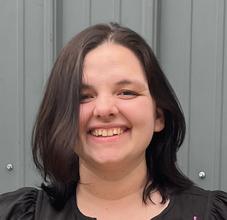

Maddie creates media content for the sustainable instagram, website, and blog. She helps plans events that are hosted by the Office of Sustainability Initiatives, such as the scavenger hunt and the Green Gala. She also attended tabling events with Leigh to educate students on the sustainability initiatives at GSU. Maddie is a senior majoring in journalism and minoring in nonprofit leadership.

Nadia Osman, Energy Intern, Fall 2023
Nadia worked on the Energy Star portfolio with Nadia and Shambhavi for GSU’s Atlanta campus. The Energy Star portfolio allows the Office of Sustainability Initiatives to track energy efficiency, along with managing water, waste, and greenhouse emissions. She was a senior and had an interdisciplinary major focusing on environmental science.
Olivia Sanford, GIS Intern, Summer 2024
Olivia is one of the members of the Tree Team, working with Sean and Daley. Olivia labeled and measured trees for the tree care plan. Olivia is a junior environmental geoscience major. She said as an intern, she can do the things she loves the most, “be outside and geek about trees.”
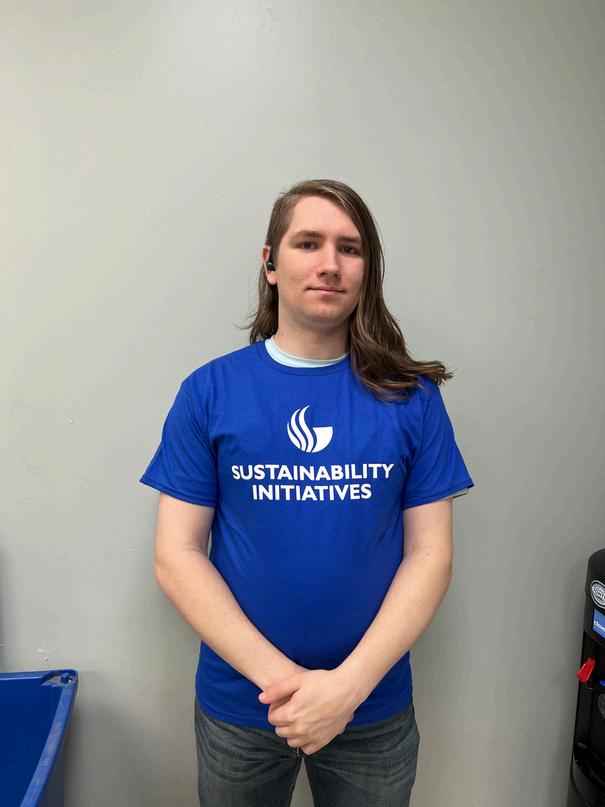
Sean Max, GIS Intern, Spring 2024
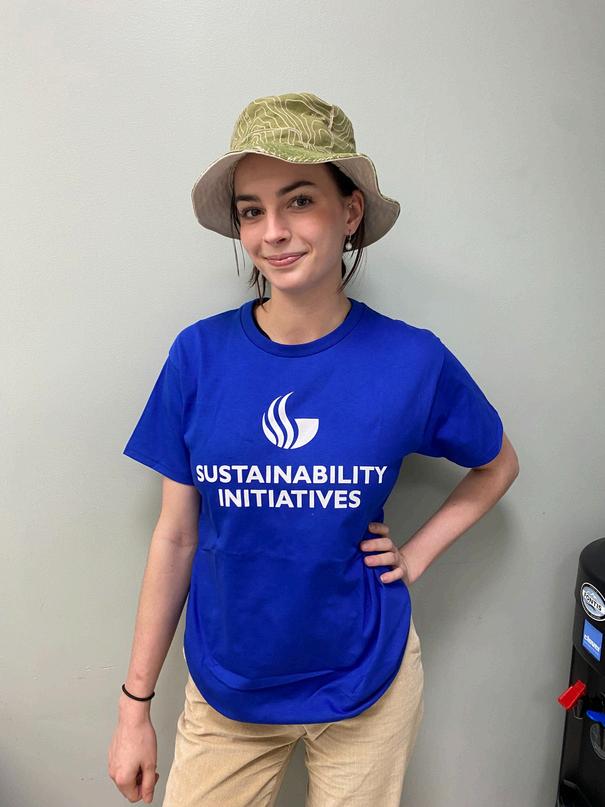
Sean used GIS (Geographic Information System) to map all the trees on the Atlanta Campus. In the summer, they worked with other members of the Tree Team to map and label all the trees and worked on a tree care plan to help the Clarkston campus achieve its Tree Campus Higher Education certification. Sean graduated in May 2024 with their bachelor’s in geoscience.
Shadia Saed, Energy Intern, Fall 2023
Shadia worked alongside Nadia and Shambhavi to work and build the Energy Star portfolio for GSU’s Atlanta campus. She was an environmental science major who loved working in energy conservation and policy.
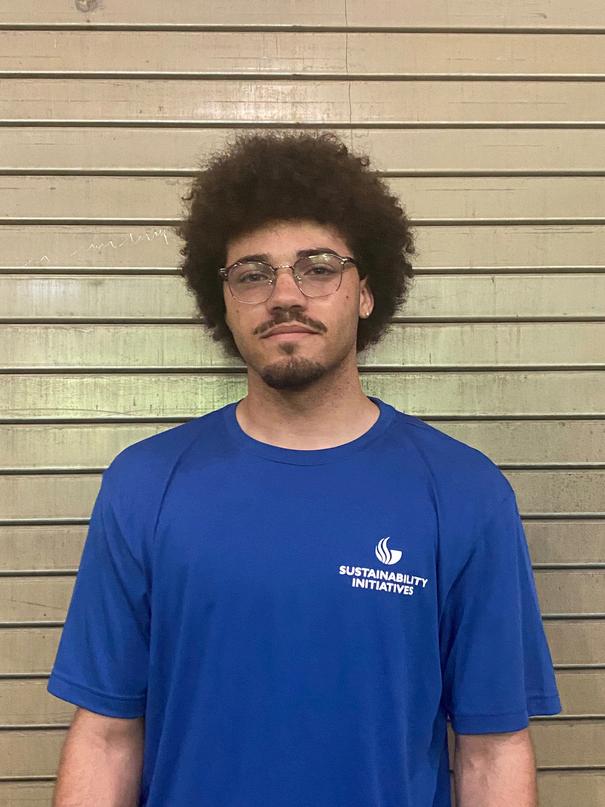

Tyler Sawyer, Recycling Ambassador, Spring 2024
Tyler is one of the members of the Recycling team. He collects recyclable materials from buildings on GSU’s campus and works at the Recycling Center at Center Parc stadium to prepare the materials to be taken to the various recyclable materials.